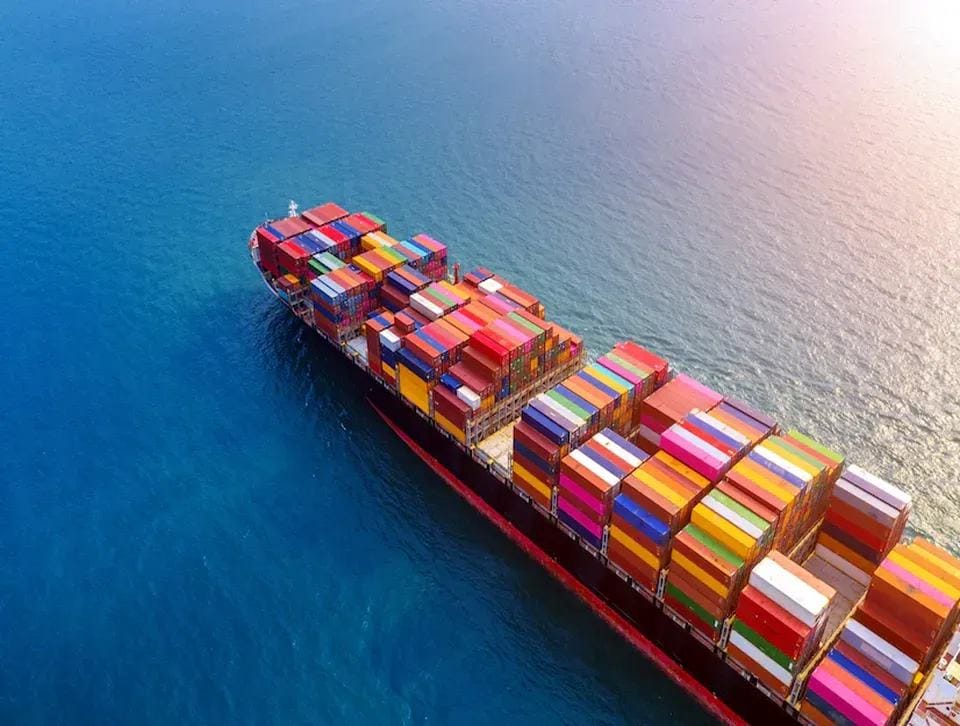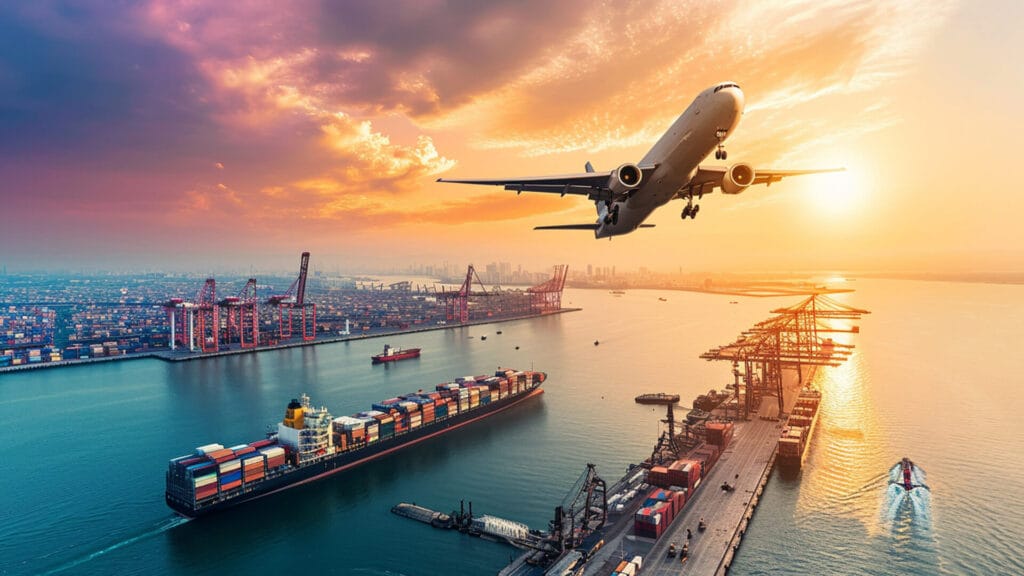Trade between China and Nigeria is becoming increasingly frequent. A large amount of goods need to be shipped from China to Nigeria through different modes of transportation. Understanding the composition and influencing factors of transportation costs is crucial for companies to optimize trade costs.
This article will introduce the details of transportation costs from China to Nigeria.
This article may help you: Cheapest Shipping Company from China to Nigeria

How to Ship from China to Nigeria
Sea freight is the most common mode of transportation from China to Nigeria, mainly because of its low cost and strong carrying capacity. Commonly used container types are 20-foot and 40-foot containers. Customers can choose full container load (FCL) or less than container load (LCL) according to the volume of goods.
Goods depart from major ports in China (such as Shanghai, Ningbo, Shenzhen, and Guangzhou) and are shipped to major ports in Nigeria (such as Lagos and Apapa). It usually takes 30-45 days, depending on the port of departure, the port of destination, and the route arrangement.
Air Freight
Air freight is undoubtedly the fastest mode of transportation, and the cost is much higher than sea transportation, which is suitable for high-value or time-sensitive goods. High security, air cargo undergoes strict security checks at the airport and is not easily subject to theft and damage during transportation.
The goods are mainly transported from major international airports in China (such as Beijing Capital Airport, Shanghai Pudong Airport, Guangzhou Baiyun Airport) to Murtala Muhammed International Airport in Nigeria. Air freight usually takes only 3-7 days, which is suitable for goods with high time requirements.
Main Factors Affecting Shipping Costs
Shipping costs from China to Nigeria are affected by many factors, the following are the main factors:
- Cargo type and volume: Different types and sizes of goods may affect transportation costs.
- Cargo type and handling requirements: Fragile, dangerous or special specifications of goods require additional handling fees.
- Transportation mode: There is a large difference between air and sea freight costs, and air freight prices are significantly higher than sea freight. .
- Port of departure and destination: Choosing different ports of departure and destination will result in differences in freight costs, such as different costs for Shanghai Port and Guangzhou Port.
- Seasonal fluctuations: For example, freight rates fluctuate during holidays or peak seasons.
- Insurance costs: Insurance costs for goods during transportation.
Cost of LCL Shipping from China to Nigeria
LCL shipping is suitable for goods that are small in volume or weight and not enough to fill a full container. Goods from multiple customers will be shipped in the same container. Compared with full container shipping, the cost is lower, but the cost may include LCL fees calculated by volume (cubic meters) or weight. The main components of the cost are:
- Ocean freight: calculated by the volume or weight of the goods, usually per cubic meter.
- Warehousing fees: warehousing fees in Chinese ports and Nigerian ports.
- Handling fees: including port operations, loading and unloading, LCL processing and other fees.
- Document fees: related document fees involving exports and imports.
- Customs clearance fees: customs clearance fees in both China and Nigeria.
- Destination port fees: including port handling fees, devanning fees and other destination port related fees
The following is the general range of LCL costs from China to Nigeria:
| POL (Port of China) | POL (Port of Nigeria) | LCL Cost/cbm |
|---|---|---|
| Shanghai | Apapa | $105–$140 |
| Shenzhen | Apapa | $106–$143 |
| Qingdao | Apapa | $108–$150 |
| Ningbo | Apapa | $110–$140 |
| Guangzhou | Apapa | $105–$150 |
| Shanghai | Tin Can Island | $102–$143 |
| Shenzhen | Tin Can Island | $105–$145 |
| Qingdao | Tin Can Island | $100–$148 |
| Ningbo | Tin Can Island | $100–$146 |
| Guangzhou | Tin Can Island | $108–$140 |
Cost of Shipping 20ft and 40ft Containers from China to Nigeria
Full container shipping is suitable for situations where the goods are large in size or high in value and can fill a container (such as 20 feet or 40 feet). The goods occupy a separate container to avoid mixing with other goods, reducing the risk of damage or loss of goods. Cost composition:
- Sea freight: Sea freight calculated according to the type of container (20 feet or 40 feet).
- Fuel surcharge: Additional charges based on global fuel price fluctuations.
- Port fees: Includes loading and unloading fees, port handling fees and container management fees.
- Document fees: Shipping and import document fees.
- Insurance costs: Cargo transportation insurance, usually based on the value of the goods.
- Customs clearance fees: Customs clearance fees in China and Nigeria.

Below is a typical range of costs for shipping 20ft and 40ft containers from China to Nigeria:
| POL (Port of China) | POL (Port of Nigeria) | 20ft Container Cost | 40ft Container Cost |
|---|---|---|---|
| Shanghai | Apapa | $2550-$3500 | $3500-$4500 |
| Shenzhen | Apapa | $2200-$3300 | $3450-$4350 |
| Qingdao | Apapa | $2650-$3650 | $3350-$4550 |
| Ningbo | Apapa | $2500-$3500 | $3250-$4550 |
| Guangzhou | Apapa | $2750-$3250 | $3450-$4600 |
| Shanghai | Tin Can Island | $2300-$3300 | $3500-$4500 |
| Shenzhen | Tin Can Island | $2600-$3500 | $3450-$4550 |
| Qingdao | Tin Can Island | $2550-$3500 | $3350-$4600 |
| Ningbo | Tin Can Island | $2450-$3500 | $3400-$4350 |
| Guangzhou | Tin Can Island | $2650-$3500 | $3500-$4600 |
Read below for container shipping costs to other countries to help you understand more:
Cost of Shipping 20ft and 40ft Containers from China to Tanzania
Cost of Shipping 20ft and 40ft Containers from China to South Africa
Cost of Shipping 20ft and 40ft Containers from China to Kenya
Cost of Shipping 20ft and 40ft Containers from China to Turkey
Cost of Air Freight from China to Nigeria
Air freight takes a shorter time and is suitable for urgent and time-sensitive goods. Air freight has certain restrictions on the volume and weight of goods, and is usually not suitable for large quantities and heavy weights. Cost composition:
- Freight: Air freight is usually calculated by kilogram or cubic meter, and the weight and volume of the goods will affect the price.
- Fuel surcharge: A surcharge based on the fuel price, usually calculated by kilogram.
- Security inspection fee: Security inspection fee for all air cargo to ensure aviation safety.
- Tariffs and customs clearance fees: Includes customs clearance fees at the destination airport, and may also be subject to import tariffs.
- Ground handling fees: The cost of loading, unloading, storage and operation of goods at the airport.
| Departure Airport (China) | Arrival Airport (Nigeria) | Cost Range (USD/kg) |
| Shanghai Pudong | Murtala Muhammed | $5.50 – $9.50 |
| Guangzhou Baiyun | Murtala Muhammed | $5.00 – $9.80 |
| Beijing Capital | Murtala Muhammed | $5.50 – $9.80 |
| Shanghai Pudong | Nnamdi Azikiwe | $5.50 – $10.00 |
| Guangzhou Baiyun | Nnamdi Azikiwe | $6.00 – $9.50 |
| Beijing Capital | Nnamdi Azikiwe | $5.50 – $9.80 |
To give you an idea of the cost of shipping to other countries, here are some of the shipping costs:
How Much Does it Cost to Ship from China to Saudi Arabia
How Much Does it Cost to Ship from China to UAE
How Much Does it Cost to Ship from China to Turkey
How Much Does it Cost to Ship from China to Ghana
How Much Does it Cost to Ship from China to Egypt?
Calculation of Cargo Weight and Volume
Freight charges from China to Ghana are usually calculated based on the actual weight or volumetric weight of the cargo, whichever is higher. This ensures that freight forwarders can reasonably calculate both large and light cargo and small and heavy cargo.
Actual weight
Actual weight refers to the actual weight of the cargo, in kilograms (kg).
For example, if the cargo weight is 50 kg and the volumetric weight is 40 kg, the actual weight of 50 kg will be used for calculation.
Volumetric weight
Volume weight is calculated based on the volume of the cargo to ensure that cargo that takes up more space can be reasonably charged.
Calculation formula: Volumetric weight (kg) = length (cm) × width (cm) × height (cm) ÷ 6000.
If the volumetric weight is higher than the actual weight, the freight will be calculated based on the volumetric weight.
Tips to Reduce Freight Costs from China to Nigeria
Controlling freight costs is the key to increasing profits in international trade. Here are a few tips to reduce freight costs from China to Nigeria:
Choose the right mode of transport
Choose the most cost-effective mode of transport based on the nature, quantity and shipping time requirements of the goods
Arrange shipping time reasonably
Try to avoid peak periods, such as before the Chinese New Year in China and before Christmas in Nigeria, to avoid peak freight increases.
Optimize cargo packaging
Pack the goods reasonably to reduce volume and weight and avoid unnecessary freight expenses.
Book in advance
Booking space in advance can lock in lower prices and avoid price increases caused by temporary arrangements.
Choose a professional freight forwarder
A professional freight forwarder can assist in arranging the right mode of transport and customs clearance procedures to avoid unnecessary delays and additional costs.

Customs Clearance and Tariffs from China to Nigeria
The customs clearance and tariff procedures for shipping from China to Nigeria are relatively complicated, involving multiple steps and fees.
Customs clearance
In Nigeria, specific customs clearance procedures must be followed when goods are imported. After the goods arrive, relevant customs clearance documents need to be submitted.
- Commercial invoice: details the name, quantity, price and other information of the goods.
- Packing list: a detailed list of the goods in the container.
- Certificate of origin: proves the origin of the goods.
- Bill of lading: a document proving that the goods have been carried and shipped to the designated destination.
- Import license (if applicable): For goods subject to import restrictions, an import license is required.
Tariffs
After the goods pass the inspection, the relevant tariffs and value-added tax (VAT) need to be paid. Nigeria’s tariffs and tax policies vary according to different categories of goods.
Nigeria’s tariffs are determined based on the classification of the goods and the HS code (customs code). Generally, the tariff rate ranges from 0% to 20%.
Tariff calculation formula: Tariff = declared value × tariff rate
Value Added Tax (VAT): Nigeria’s standard VAT rate is 7.5%. Almost all imported goods are subject to VAT.
VAT = (declared value + tariff) × VAT rate
The transportation costs from China to Nigeria involve many aspects. Through this article, you can understand the cost composition, calculate taxes and fees, and the strategy of cost, which can optimize trade costs and enhance the competitiveness of enterprises.
